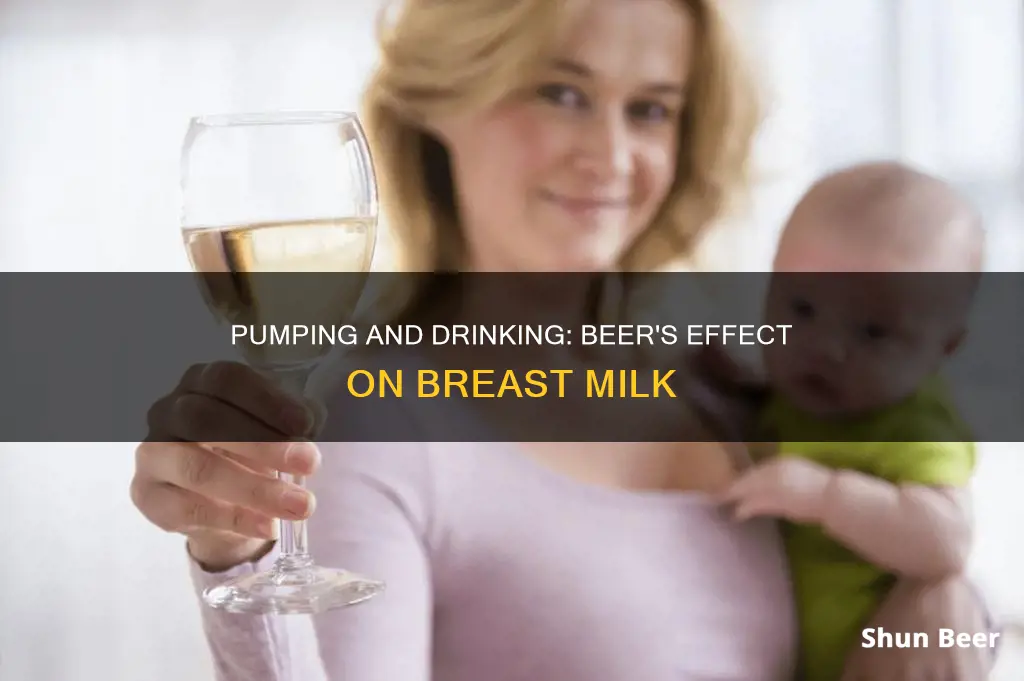
It is not advisable to consume alcohol while breastfeeding, as it can be harmful to the baby's health and development. However, having an occasional drink is considered okay, as long as it is timed correctly and limited to one drink per day. It is recommended to wait for at least two hours after drinking before breastfeeding or pumping, as alcohol can pass into breast milk and may lead to negative effects on the baby's sleep patterns, weight gain, and development. Pumping and dumping is not an effective way to remove alcohol from the system, as it will leave the breast milk and bloodstream naturally.
| Characteristics | Values |
|---|---|
| Is it safe to drink beer while breastfeeding? | It is probably safe to drink very moderately while breastfeeding, if you take a few precautions. Having one drink a day hasn't been found to be harmful to a nursing baby, especially if you wait at least two hours between drinking and nursing or pumping. |
| How long should you wait after drinking beer before breastfeeding? | It takes about two hours for the average adult to metabolize one drink. It is recommended to wait at least two hours after drinking one standard drink before breastfeeding your baby. |
| Does beer increase milk supply? | There is no scientific evidence to support the popular wisdom that drinking beer boosts milk supply. |
What You'll Learn

How long does it take for alcohol to leave breast milk?
While it is recommended that breastfeeding mothers abstain from drinking alcohol, it is understood that some mothers may choose to consume alcohol in moderation. If you are breastfeeding and choose to drink alcohol, it is important to know how long alcohol stays in your breast milk and how this can affect your baby.
The amount of time it takes for alcohol to leave breast milk will vary from person to person. The factors that influence this include:
- The amount of alcohol consumed
- How quickly the alcohol was consumed
- Whether the alcohol was consumed with food or on an empty stomach
- The mother's weight
- How fast the mother's body can metabolize and break down alcohol
Generally, smaller mothers will need more time to process and eliminate alcohol from their bloodstream, and subsequently, their breast milk.
Alcohol levels in breast milk are typically highest 30 to 60 minutes after drinking. It is recommended to wait at least two hours after drinking before breastfeeding or pumping again. This allows alcohol levels in the breast milk to decrease. If you are unable to wait, you can feed your baby with previously expressed milk.
It is important to note that pumping and dumping will not decrease the amount of alcohol in your breast milk. The only way to reduce alcohol levels in your breast milk is to wait for it to leave your bloodstream over time.
To minimize the amount of alcohol passing into your baby's system through breast milk, it is recommended to wait several hours after drinking alcohol before breastfeeding or pumping.
Beer and Forteo: Is it Safe to Drink?
You may want to see also

Does alcohol affect breast milk production?
Drinking alcohol while breastfeeding is a common concern for new mothers. While it is generally advised to avoid alcohol during pregnancy, the effects of alcohol consumption while breastfeeding are less clear. According to sources, occasional drinking is considered safe for breastfeeding mothers, but heavy and habitual drinking can be harmful to the baby's health and development. Here is some information regarding the impact of alcohol on breast milk production:
- Recommendations for drinking while breastfeeding: According to the American Academy of Pediatrics (AAP), it is recommended to wait for at least two hours after drinking before nursing again to ensure that the alcohol has left the mother's system. This is because any alcohol in the mother's bloodstream will pass into the breast milk, which can pose potential risks to the baby's health. The AAP also warns that regular alcohol consumption can decrease breast milk supply.
- Impact on milk production and ejection reflex: Research suggests that alcohol can negatively impact milk production and the milk ejection reflex. One study found that nursing infants consumed approximately 20% less breast milk in the first four hours after their mothers consumed alcohol, despite spending a similar amount of time on the breast. This reduction in milk intake may be due to the inhibitory effects of alcohol on the hormones oxytocin and prolactin, which are crucial for milk ejection.
- Long-term effects on the baby: There are concerns about the long-term effects of alcohol exposure through breast milk on the baby's development. Some studies suggest that repeated exposure to alcohol in breast milk may affect the baby's cognitive development and academic performance later in life. For example, a 2018 study found that 6 and 7-year-old children who were exposed to alcohol in breast milk as babies scored lower on reasoning tests compared to their peers who were not exposed.
- Guidelines for safe drinking while breastfeeding: To minimise the impact of alcohol on breast milk production and the baby's health, it is recommended to limit alcohol intake to one drink per day or less. It is also important to wait for at least two hours after drinking before breastfeeding or pumping milk. Additionally, drinking a glass of juice or eating food while consuming alcohol can help slow the rate at which alcohol enters the bloodstream.
- Pumping and dumping: Pumping and dumping breast milk after drinking alcohol is not necessary to remove alcohol from the system. Alcohol will naturally leave the bloodstream and breast milk over time. However, pumping and dumping may be helpful to relieve engorgement or to dispose of milk that may still contain alcohol.
- Overall recommendations: While occasional drinking is generally considered safe, it is always better to avoid alcohol altogether for overall health. If a breastfeeding mother chooses to drink, it is important to drink responsibly, time alcohol consumption properly, and ensure that the alcohol has left the system before breastfeeding again.
Florida Law: Drinking Beer and Driving
You may want to see also

When should you pump and dump?
Pumping and dumping is a personal choice. It is not necessary to do so after drinking alcohol, as the alcohol will leave your breast milk as it leaves your bloodstream. However, if you are feeling engorged and in discomfort, pumping and dumping can help you feel more comfortable.
Pumping and dumping may be a good idea if:
- You are away from your baby and don't have access to a fridge to store your milk.
- You are feeling engorged and in pain.
- You are on a work trip or a weekend getaway without your baby, and you don't want to carry bottles of milk back home.
- You have consumed alcohol and want to avoid feeding your baby milk that may still contain alcohol. In this case, it is recommended to wait at least two hours after drinking before pumping and dumping, as that is the amount of time it takes for alcohol to leave your breast milk.
- You are taking certain medications that may be passed into your breast milk. Consult your doctor to find out if the medication you are taking is safe for breastfeeding.
Remember that pumping and dumping does not get rid of alcohol in your system any faster. It is also not necessary to pump and dump after drinking alcohol unless you are feeling uncomfortable or want to avoid feeding your baby any milk that may contain alcohol.
Cold Medicine and Beer: What's Safe?
You may want to see also

What are the risks to the baby?
Drinking alcohol while breastfeeding can have several negative consequences for the baby. Firstly, alcohol can cause sleep disturbances in babies, including shorter sleep periods, more frequent wakefulness, and reduced total active and REM sleep in the three-hour period after exposure to alcohol. Increased REM sleep can also occur between 3.5 hours and 24 hours after alcohol exposure. This is due to the impaired REM sleep and increased startling/arousal that alcohol causes.
Secondly, alcohol consumption by the mother can lead to decreased milk intake and weight gain in the baby. This is because alcohol inhibits the milk ejection reflex, resulting in a reduction of the baby's milk intake.
Thirdly, regular alcohol consumption by the mother can decrease milk supply over time. Alcohol interferes with the hormones oxytocin and prolactin, which are involved in milk production.
Additionally, there are potential long-term effects on the baby's development, including impaired immune function, delayed motor development, and potential impairment of cognitive development. Research has shown that children exposed to alcohol in breast milk as babies scored lower on reasoning tests at 6-7 years of age compared to those who were not exposed.
It is important to note that the effects of alcohol on the baby depend on the amount consumed by the mother and the timing of breastfeeding after alcohol intake. The more alcohol consumed, the longer it takes to clear the mother's system, and the higher the risk of negative consequences for the baby.
Beer and Sinus Infections: Is It Safe to Drink?
You may want to see also

How much alcohol is safe for a breastfeeding mother?
The general consensus is that drinking alcohol while breastfeeding is not recommended. However, having one drink a day has not been found to be harmful to a nursing baby, especially if the breastfeeding mother waits at least two hours between drinking and nursing or pumping. According to the American Academy of Pediatrics, breastfeeding mothers should avoid alcohol because it does reach the baby through breast milk. While the amount transferred is relatively small, a baby's liver is immature and cannot process and eliminate alcohol as quickly as an adult.
Research shows that drinking alcohol regularly may decrease breast milk production and the amount of milk the baby drinks. Alcohol has been shown to negatively affect babies' sleep patterns, disrupting their sleep after even a small to moderate amount of alcohol. Some researchers have concluded that repeated exposure to alcohol in breast milk could cause long-term harm to nursing babies, but more studies are needed in this area.
The amount of time it takes for alcohol to leave a person's body varies from person to person, depending on weight, the amount consumed, how fast they drink, whether they eat while drinking, and how quickly their body breaks down alcohol. Generally, alcohol will stay in a person's milk for as long as it is in their bloodstream, and the levels in both will fall over time.
If a breastfeeding mother chooses to drink alcohol, it is recommended to time it right after breastfeeding or pumping and storing breast milk before drinking, so the baby can be fed with expressed milk from a bottle if they are hungry in the hours following alcohol consumption. Another option is to feed the baby formula in the hours following alcohol consumption. It is important to avoid co-sleeping with the baby if alcohol has been consumed, as this increases the risk of SIDS.
Antibiotics and Alcohol: Is Beer Safe During Treatment?
You may want to see also
Frequently asked questions
It is not recommended to consume alcohol while breastfeeding, but if you do, it is advised to wait at least 2 hours before nursing or pumping.
It is recommended to wait at least 2 hours after drinking one standard drink before breastfeeding. If you have had two drinks, wait 4 to 5 hours.
Regular alcohol consumption can negatively impact breast milk supply and the let-down reflex, which is a hormonal reaction that allows the body to eject milk.
Alcohol passes into breast milk and can affect a baby's sleep patterns and growth/development. It can also change the taste of the milk.
Pumping and dumping is not necessary to remove alcohol from breast milk or your system. It is only effective for comfort or to relieve engorgement.







